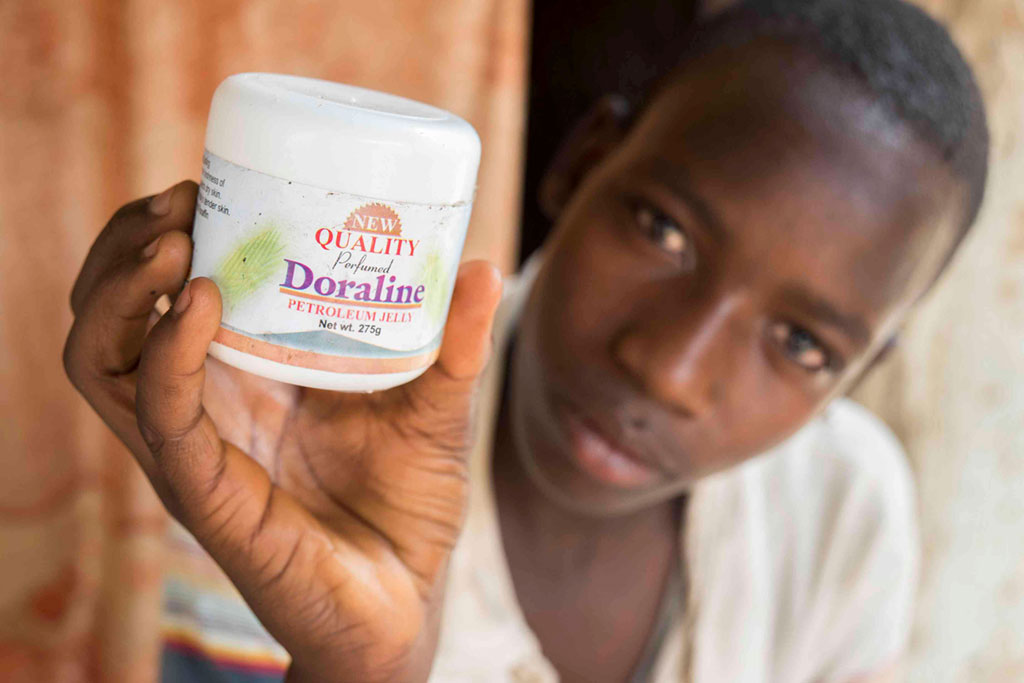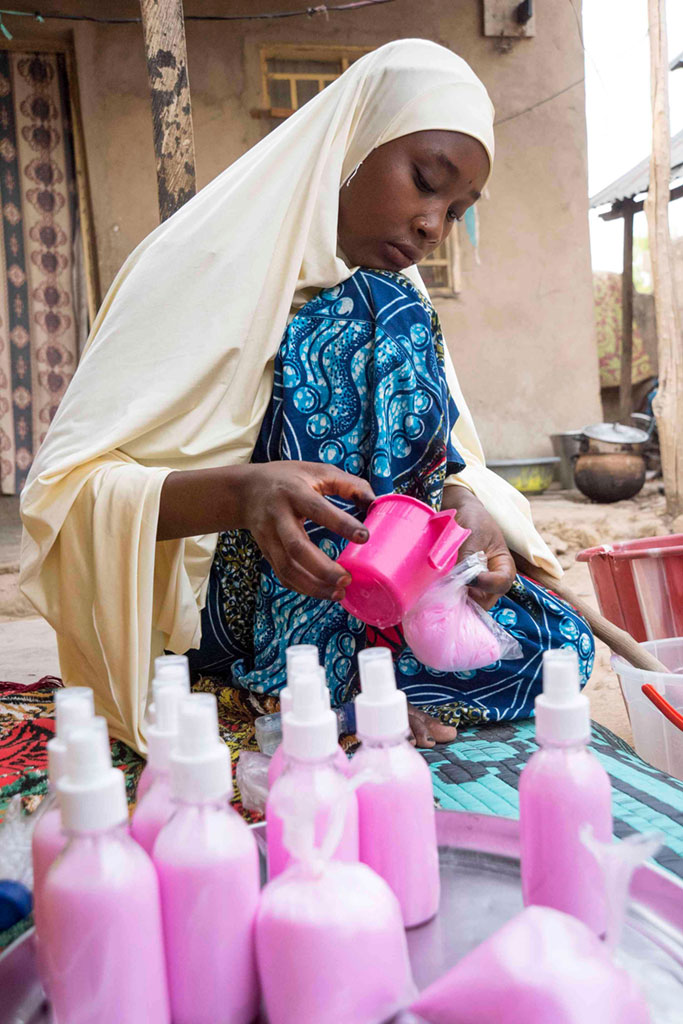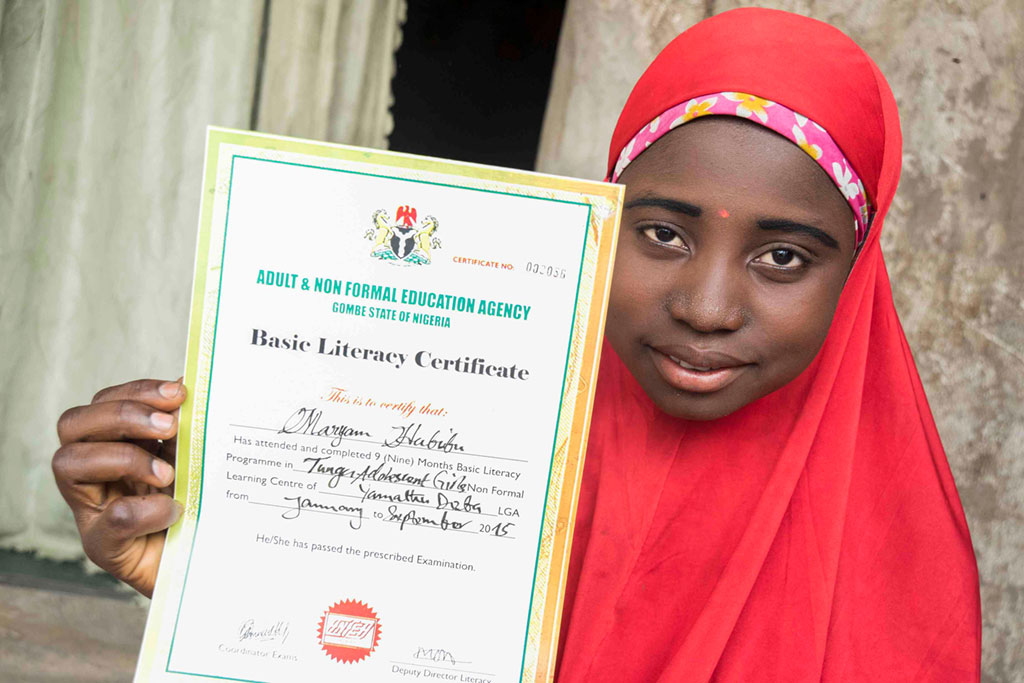Muhammed Shehu starts by making a fire. Once the flames are high he puts a pot over them, and when the pot is hot he adds a candle. To the melted wax he adds oil, mixes it until the concoction is smooth, removes the pot from the heat and adds liquid oil and fragrance, then waits for it to cool before pressing it into pots.
Sixteen-year-old Muhammed learned how to make these little jars of scented lotion through an after-class program organized by the Nigeria Education Crisis Response Program, which targets internally displaced school-aged children and teens like him.
Funded through the U.S. Agency for International Development, the program is working with Northern Nigerian communities, civil society organizations and state governments to forge a safety net for more than 54,000 youth displaced by violence.

Implemented by Creative Associates International, the International Rescue Committee and dozens of Nigerian groups, USAID’s Education Crisis Response program organizes communities to create non-formal learning centers that provide specialized classes in literacy and basic math, along with much-needed psychosocial support. The goal is to give them enough accelerated learning that they can make up for lost time and eventually mainstream back into Nigeria’s formal school system or join the labor market.
But numbers shape the reality of older children like Muhammed, who are often counted on to contribute to the family income. For households that lost their primary sources of income due to displacement, death or instability, the need to bring in money can overwhelm the desire to keep learning.
“A good number of these kids have been traumatized, and the means of livelihood of their parents has been completely wiped off,” says Ayo Oladini, Project Director. “You heard of so many farms destroyed… (and) everything they could use for their income gone.”
Oladini knows that giving northern Nigerian youth the best education in the world won’t matter if they cannot not afford to be there. And he knows that once these youth move on from school, it is essential that they have a skill to fall back on.
Benefits to the community
The Nigeria Education Crisis Response Program has identified internally displaced students from ages 13 to 17 who could benefit from learning a trade and has developed courses to teach them knitting, soap-making, tire repair, baking, batik and sewing all required by the labor market.
The teens learn skills that are simple and easy to learn in just a few hours of training per week. Local artisans or workers—who have seen the benefits of giving the displaced teens a productive skill—volunteer their time to teach them the crafts.

Moreover, the products they learn to make have been identified as marketable and in demand within their communities. Batik cloths are used for newborn babies, girls enrolling in school need new hijabs and everyone wants to look and smell nice on the weekends, Oladini explains.
“We are looking at what could give them a means of livelihood, a kind of economic independence,” he says.
Having that productive outlet is also a protective factor for teens who might otherwise have a lot of empty time on their hands. “You teach a young youth who probably has a lot of energy that could have been directed to a lot of negative things on simple skill like vulcanizing,” says Oladini, “and he earns some little money. And he becomes a little more confident about his future.”
Low skill, high yield
Oladini describes the jobs teens take on as low-skill, high-yield.
Maryam Habibu, who left Chad with her family a year ago, learned to knit at one of the program’s centers in Gombe. She knits up to two caps and two table spreads for sale each week. Each cap earns her 150 Nigerian Naira and the spreads, about 300—or about $4.50 per week.
This money makes a difference. After using her profits to replenish her supplies, it enables her to pay the fees of the Islamic school she’s enrolled in and to assist her parents.

“A lot of girls who probably would have been roaming the streets or who would have become prey to sexual abuse have taken off with…little skill and begun to realize the potential of the economic opportunity within them,” says Oladini.
He says the program gave careful thought to what skills would give youth like Maryam valuable business opportunities in a short time-frame and then let them choose based on their interests which to focus on.
Muhammed says he started learning many skills at the non-formal education center set up by the Education Crisis Response program, but decided for himself to go into the lotion business. He sells his larger cans for 90 Naira and small ones for 30—about the equivalent of 45 cents for the larger cans and 15 cents for the small. He can produce around 12 cans each week, which he sells in the marketplace every Saturday and Sunday.
The profits seem meager—but they are enough to fuel his dreams of becoming a medical doctor. The earnings Muhammed brings home from his small business are enough to pay for his school supplies, books and shoes.
Muhammed has been in Gombe for three years, since his family left the town of Biu in Borno State when he was 13 years old. With his father recently deceased, every Naira counts.
“It really helps me,” he says.
Reported from Nigeria by Michael. Zamba.
